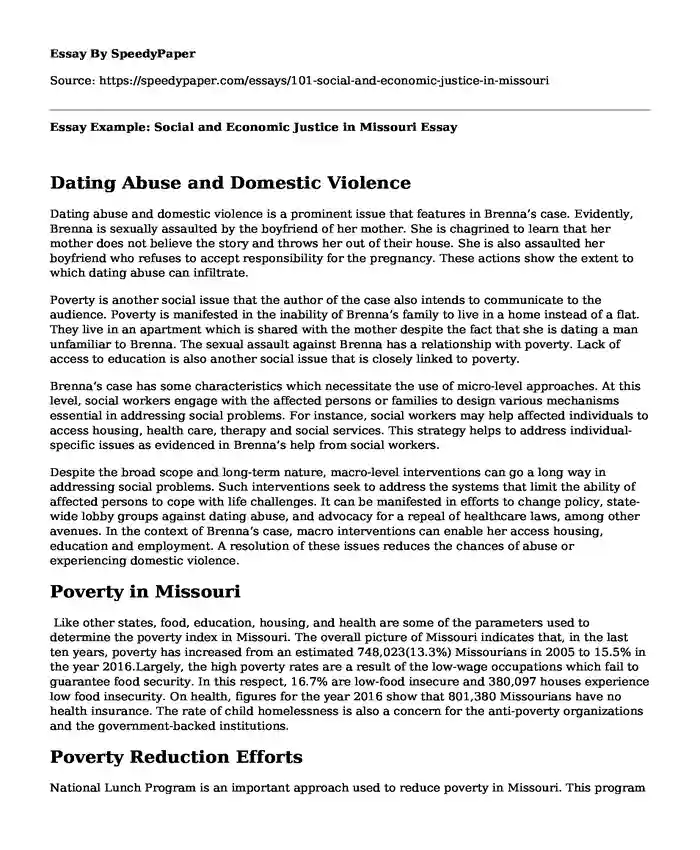
| Type of paper: | Essay |
| Categories: | Economics Abuse Social justice |
| Pages: | 3 |
| Wordcount: | 647 words |
Dating Abuse and Domestic Violence
Dating abuse and domestic violence is a prominent issue that features in Brenna’s case. Evidently, Brenna is sexually assaulted by the boyfriend of her mother. She is chagrined to learn that her mother does not believe the story and throws her out of their house. She is also assaulted her boyfriend who refuses to accept responsibility for the pregnancy. These actions show the extent to which dating abuse can infiltrate.
Poverty is another social issue that the author of the case also intends to communicate to the audience. Poverty is manifested in the inability of Brenna’s family to live in a home instead of a flat. They live in an apartment which is shared with the mother despite the fact that she is dating a man unfamiliar to Brenna. The sexual assault against Brenna has a relationship with poverty. Lack of access to education is also another social issue that is closely linked to poverty.
Brenna’s case has some characteristics which necessitate the use of micro-level approaches. At this level, social workers engage with the affected persons or families to design various mechanisms essential in addressing social problems. For instance, social workers may help affected individuals to access housing, health care, therapy and social services. This strategy helps to address individual-specific issues as evidenced in Brenna’s help from social workers.
Despite the broad scope and long-term nature, macro-level interventions can go a long way in addressing social problems. Such interventions seek to address the systems that limit the ability of affected persons to cope with life challenges. It can be manifested in efforts to change policy, state-wide lobby groups against dating abuse, and advocacy for a repeal of healthcare laws, among other avenues. In the context of Brenna’s case, macro interventions can enable her access housing, education and employment. A resolution of these issues reduces the chances of abuse or experiencing domestic violence.
Poverty in Missouri
Like other states, food, education, housing, and health are some of the parameters used to determine the poverty index in Missouri. The overall picture of Missouri indicates that, in the last ten years, poverty has increased from an estimated 748,023(13.3%) Missourians in 2005 to 15.5% in the year 2016.Largely, the high poverty rates are a result of the low-wage occupations which fail to guarantee food security. In this respect, 16.7% are low-food insecure and 380,097 houses experience low food insecurity. On health, figures for the year 2016 show that 801,380 Missourians have no health insurance. The rate of child homelessness is also a concern for the anti-poverty organizations and the government-backed institutions.
Poverty Reduction Efforts
National Lunch Program is an important approach used to reduce poverty in Missouri. This program ensures that poor children get good diet food while attending lessons in school. This initiative has shown positive outcomes in attendance improvement and also acted as a psychological remedy for depression among poor children. These efforts should be augmented by deploying experienced teachers to poor districts in the country. This move would enable children to benefit from experienced teachers. Also, access to education improves social mobility since people who progress further in education (e.g., college education) are more likely to earn better later in life. The increased earnings often translate into a better life.
Engagement with local communities is also common among the poverty-reduction organizations in Missouri. This approach seeks to partner with the people who live below poverty line. Also, faith-based institutions involve local actions groups to identify the most pressing areas so as to design appropriate interventions. These approaches can be reinforced through incentives for business organizations to invest the state. This will boost local economies thereby creating jobs for millions of young Missourians. As a result, upward mobility would be promoted which, in turn, could translate into better lives.
Cite this page
Essay Example: Social and Economic Justice in Missouri. (2018, Jul 25). Retrieved from https://speedypaper.com/essays/101-social-and-economic-justice-in-missouri
Request Removal
If you are the original author of this essay and no longer wish to have it published on the SpeedyPaper website, please click below to request its removal:
- Free Essay on Asian Pacific American Experiences: Past, Present, and Future
- Free Essay on Hospital Discharge Teaching
- Free Human Resource Management Essay
- Culture of India, Free Paper Sample from Our Database
- Free Essay Example on How Relationship Abuse Causes Change in Behavior
- Afghanistan and the United States of America - Foreign Policy Essay Sample
- Case Study of Supply Chain Management in IKEA - Paper Example
Popular categories




